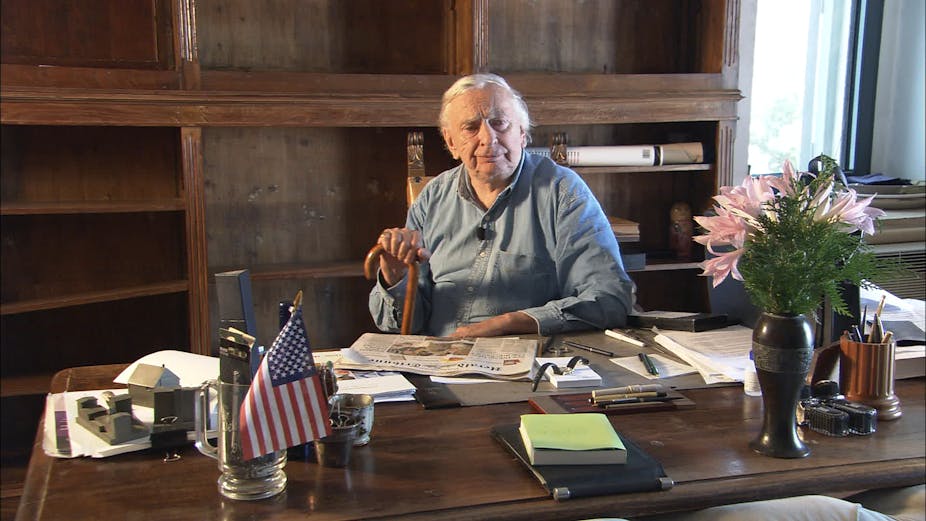Gore Vidal: The United States of Amnesia – by the Australian film-maker Nicholas Wrathall – has been doing the rounds of festival circuits since its release last year, and is currently showing at special screenings throughout Australia ahead of airing on ABC later this month. But should we care? What marks Vidal, who died in 2012, out as a still-necessary, international voice?
Vidal’s passing, at 86, was marked not only in the literary community of which he was an esteemed part, but across the whole world he had so successfully stalked through his long life. Famous as a novelist, playwright, screenwriter, essayist and wit, he had been a gadfly to the claims of what he termed the American Empire from the opening salvos of the Vietnam War to the disaster of Iraq 40 years later, launched by a president whom he described as “the stupidest man in the United States” and threatening to erode even more the great republic he loved so much.

“Our form of democracy is bribery, on the highest scale,” he lamented and an enormous part of his prodigious energy was spent railing against the hucksters, liars, cheats and thieves he saw assiduously dismantling all that was good in America, and replacing it with a system so corrupt it rivalled Rome at the moment of its precipitous decline.
But behind this Augustan figure lay a complex man who used his wit and charm to protect himself from profound sense of insecurity that ran through his entire life. The privileged son of a well-known political family steeped in the melancholic virtues of the same deep south that had produced Mark Twain and Tennessee Williams, Vidal seemed destined for greatness from the very beginning.
But when his third novel, The City and the Pillar (1946), was published in 1946, its openly gay protagonists and themes brought him instant notoriety and opened for him the life of the iconoclast instead. A role he took to with glee, succeeding in insulting practically anyone worth insulting through an entire era, from Truman Capote (“Truman made lying an art form – a minor art form.”) to arch conservative William F. Buckley (a “crypto-Nazi”) and even his good friend, John F. Kennedy (“He was one of the most charming men I’ve ever known. He was also one of the very worst presidents.”)
And that, indeed, may be Vidal’s legacy, an almost limitless supply of bon-mots sprinkled across the tawdry tapestry of our recent history. That, and a stunning repudiation of the pretensions of empire from someone with every right to be called an Establishment Insider.
And it is this side of Vidal that Wrathall treats in The United States of Amnesia.

Featuring some of the last interviews with the great writer, it shows his anger unquenched and passion relentless. “We learn nothing because we remember nothing,” he says, and it is this process of remembering and recalling that reveals itself to be the core of his life’s work, as he set about not only chronicling and satirising the weaknesses and hypocrisies of the present, in books such as Myra Breckinridge (1968) and Live from Golgotha (1992), but more seriously in plotting the betrayal and eclipse of the American republic in the grand sweep of historical novels, from Burr (1973) and Lincoln (1984) to The Golden Age (2000) a work of seven novels in all that took 33 years to complete where the destruction of the American dream at the hands of self servers and charlatans was depicted with terrifying relish.
“There is only one party in the United States,” he once said, “the Property Party … and it has two right wings: Republican and Democrat”. He remained true to that insight to the day he died.
But this film is not so much about his death, though watching a warrior stoically making his exit is a humbling experience, as much as an account of a life lived at full throttle, totally engaged with the drama of his times and fearlessly taking sides when all about are running for cover.
Because unlike his enemies, Vidal finally had faith in people and their desire to know and cherish the truth, and like his maternal grandfather, the politician Thomas Gore, saw himself as a tribune, giving form and words to the people’s unease and concerns. And for this he was reviled, ridiculed and sidelined by the political establishment merrily sowing the seeds of America’s destruction.

And that is what finally makes this portrait a bitter-sweet document. Vidal’s positions on everything from Vietnam to Iraq and Afghanistan have finally been vindicated. Unmitigated disasters speeding America’s demise. And while he might gleefully quote the four most beautiful words in the English language as “I told you so,” there is no doubt he went to the grave a patriot who stood against the Patriot Act and a lover of mankind painfully aware of the weakness and fallibility of his fellow humans.
“Solidarity,” one of his Italian neighbours says to him in the new film as he is wheeled out of the home he shared with Howard Austen, his lover and companion of 53 years till Austen’s death in 2003. “Solidarity,” Vidal echoes, giving the clenched fist salute.
It is a touching moment of great power that reveals the man of compassion beneath the steely surface of an indomitable foe. Perhaps never achieving the literary heights he hoped he would, he nevertheless gave voice to the great misgivings of his countrymen as they stood appalled at the betrayal of all their dreams, and remembered the promise of what once was.
Gore Vidal: United States of Amnesia is showing at special screenings throughout Australia and will be shown on the ABC on July 27.

